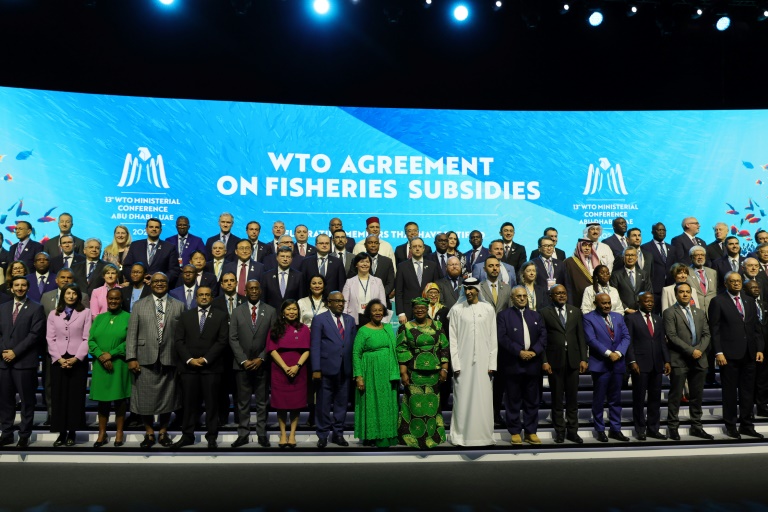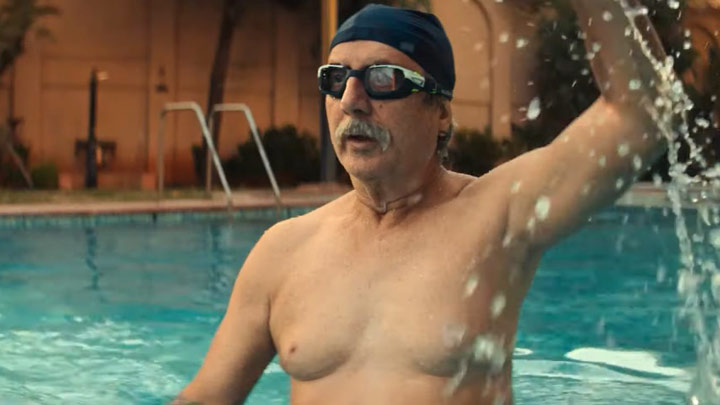The world’s trade ministers were locked in deadlocked negotiations Friday following overnight talks as a major WTO conference postponed its closing session for a fourth time with no deals in sight.
An Indian-led push for permanent rules governing public stockholding of food reserves has drawn deep objections from other members at the World Trade Organization’s 13th ministerial meeting in Abu Dhabi, according to sources close to the talks.
The standoff is imperilling a wider package of agreements on fisheries and an e-commerce moratorium only hours before the deadline, the sources added, speaking on condition of anonymity as they are not permitted to discuss ongoing negotiations.
The WTO meeting in the capital of the United Arab Emirates was initially scheduled to wrap up on Thursday. But it was extended beyond its scheduled deadline four times amid rifts between the body’s 164 members who must reach unanimous consensus to chalk up any deal as per WTO rules.
A closing conference previously scheduled for 1300 GMT on Friday was pushed back by three hours, as trade ministers negotiated new draft texts on fisheries and agriculture after all-night talks.
“Negotiations on key files are in full swing,” the European Union’s WTO mission said on X, formerly Twitter, noting that “challenges remain.”
Earlier, WTO spokesman Ismaila Dieng said ministers were engaged in “intensive and difficult discussions on a package of agreements for adoption at MC13.”
The WTO — the only international body dealing with the rules of trade between nations — is under pressure to secure some wins at MC13 to prove its relevance.
Its 12th ministerial conference in Geneva in 2022 was hailed as a landmark success following deals on fisheries and a commitment by members to restore a now-defunct dispute settlement body before the end of this year.
“Our challenge this week is to demonstrate that MC12 wasn’t a one-off miracle,” WTO Director-General Ngozi Okonjo-Iweala said on Monday.
With farmer protests sweeping Europe and India, agriculture agreements have emerged as a particularly sensitive topic of debate.
Member states are trying to negotiate a text listing the subjects that merit further discussion.
A key sticking point is a demand by India and other member states for permanent rules governing public stockholding of food reserves to replace temporary measures adopted by the WTO.
One proposal on the table suggests taking a step in that direction, but a timetable and other details still need to be defined.
Hours away from the deadline, ministers sat for an “open ended meeting on agriculture with the revised text,” the European Union’s Agriculture Commissioner Janusz Wojciechowski said on X, formerly Twitter.
“Agriculture is again the topic that makes or breaks a ministerial conference. Outcomes are uncertain until the last hours,” he said.
A source close to the discussions said progress on agriculture is still blocked.
Trade ministers are also at an impasse over a new deal on fisheries subsidies.
After a 2022 deal which banned subsidies contributing to illegal, undeclared and unregulated fishing, the WTO hopes to conclude a second package focusing on subsidies which result in overcapacity and overfishing.
Negotiations in recent months at the WTO headquarters in Geneva have enabled a draft text to be brought forward for a second fisheries deal.
It provides flexibility and advantages for developing countries.
But some — notably India — are demanding further concessions, including transition periods that others consider to be too long.
After all-night negotiations, a new draft fisheries agreement was brought forward early Friday.
But there is little consensus yet on transition periods and what constitutes small-scale artisanal fishing that would benefit from specific exemptions.
Also at stake at MC13 is the fate of an e-commerce customs moratorium.
Since 1998, WTO members have agreed not to impose customs duties on electronic transmission of digital products.
The moratorium has been extended at most ministerial meetings since then, but objections by India and other member states are now throwing it into jeopardy.
On Thursday, India, along with Brazil, once again threatened to block the moratorium’s extension, arguing that it harms customs revenues, according to several sources close to the talks.
The EU and the UK are among the most vocal advocates of an extension, saying that many countries would lose considerably more in gross domestic product (GDP) than they would gain in tariffs if the moratorium lapses.







